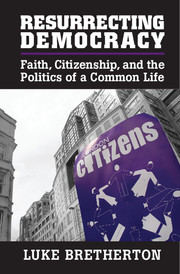Book contents
2 - Faith and Citizenship in a World City
Published online by Cambridge University Press: 18 December 2014
Summary
To see how Alinsky’s legacy traveled and developed historically and geographically, we move from North America to Europe and, more specifically, to the context and work of London Citizens. The aim of this chapter and of Chapter 3 is to immerse the reader in one specific context – London – and some of the ways in which organizing was adapted to address the demands of working in that context. The chapters provide a backdrop and point of reference for the detailed description and analysis of how to organize, which is set out in Chapters 4 and 5, and the subsequent examination of the relationship between faith, citizenship, and the politics of a common life in the rest of the book.
We begin by picking up where we left off in the Introduction: the events taking place on November 25, 2009. The central figure of the press conference held at the coffee shop on Brushfield Street was Rabbi Natan Asmoucha. Rabbi Asmoucha’s story is important because within it two worlds collided: the one represented by those gathered in the coffee shop and the other by those seated in the plush offices of Allen & Overy. Rabbi Asmoucha had hosted a gathering at the Bevis Marks synagogue on July 22, 2009. The Bevis Marks synagogue is Britain’s oldest synagogue and centrally located in the City of London. This event marked the beginning of the process that eventually resulted in the proposals that were to be set out at the Barbican assembly. Given the history of the link between usury and anti-Semitism in Europe, it was felt to be symbolically crucial by London Citizens not only to involve the Jewish community from the outset (despite no synagogue formally being a member at this point) but also to launch any initiative from a synagogue so as to decouple the focus on usury and responsible lending from any association with anti-Semitism. The initiating event involved Christians, Muslims, and Jews, as well as representatives from other members of London Citizens gathering at Bevis Marks before marching together the short distance to the Royal Bank of Scotland (RBS). Once at the bank, they tried to present its chairman with a copy of the Torah, the Bible, and the Qur’an with passages highlighted in each text that discussed the evils of usury (Figures 2.1 and 2.2).
- Type
- Chapter
- Information
- Resurrecting DemocracyFaith, Citizenship, and the Politics of a Common Life, pp. 57 - 75Publisher: Cambridge University PressPrint publication year: 2014



